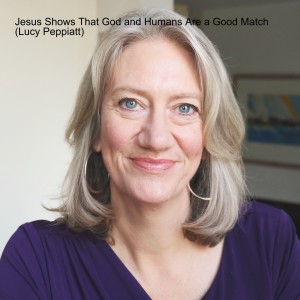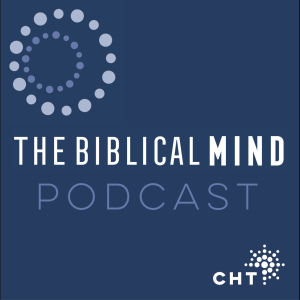The Biblical Mind
The Biblical Mind is dedicated to helping its audience understand how the biblical authors thought, promoting Bible fluency through curious, careful reading of Scripture. It is hosted by Dr. Dru Johnson and published by the Center for Hebraic Thought, a hub for research and resources on the intellectual world of the Bible.
The Biblical Mind is dedicated to helping its audience understand how the biblical authors thought, promoting Bible fluency through curious, careful reading of Scripture. It is hosted by Dr. Dru Johnson and published by the Center for Hebraic Thought, a hub for research and resources on the intellectual world of the Bible.
Episodes

Friday Apr 28, 2023
ICYMI: Jesus Shows That God and Humans Are a Good Match (Lucy Peppiatt)
Friday Apr 28, 2023
Friday Apr 28, 2023
This episode was originally published on May 5, 2021. We thought it was worth a reissue for our newer listeners.
"It was most fitting for God to come save the people he made in the first place," says Dr. Lucy Peppiatt, Principal at Westminster Theological Centre.
The early church loved to discuss the "fittingness of the Son to become human," because it implies that God has a passion for man. He purposed from the beginning of time that He would come to save us, as one of us, and that means that there is something about humans that is fitting to be united with God. And that is the gospel.
In this episode, Dr. Dru Johnson and Dr. Peppiatt talk all about Jesus of Nazareth: Who was he? Who did people think he was? Why did he teach and present himself indirectly rather than just revealing himself to man? Dru and Dr. Peppiatt address challenging questions about the hiddenness of God in Christ, the incarnation, the union of the divine and the human in the Son, and more.
Show notes:
1:55 Why didn’t Jesus reveal himself to man while he was on Earth?
5:24 Athanasius of Alexandria on Jesus
7:13 Wrestling in the church: Jesus intellectually reasoned with us
15:40 Is there value to the struggle?
19:50 Is there something human about God?
24:37 Impoverished theology
Show notes by Serena Tuomi.
Credits for the music used in TBM podcast can be found at: hebraicthought.org/credits.

Friday Apr 21, 2023
What the Image of God Is and Is Not (Carmen Imes)
Friday Apr 21, 2023
Friday Apr 21, 2023
You might have heard that being made in the image of God refers to human rationality, relationality, moral agency, or some combination of these qualities. Dr. Carmen Imes disagrees.
She and Dru discuss what they think the author of Genesis was actually referring to with the phrase "image of God," in light of Carmen's latest book Being God's Image: Why Creation Still Matters (forthcoming in June, 2023). Along the way, they discuss artificial intelligence, the resurrection and renewal of creation, and why Eve should have been more assertive.
Carmen (PhD in Biblical Theology, Wheaton College) is Associate Professor of Old Testament at Biola University. She is also the author of Bearing God’s Name: Why Sinai Still Matters. Carmen is an active member of the Evangelical Theological Society, the Institute for Biblical Research, the Society of Biblical Literature, and the Canadian Society of Biblical Studies. Carmen keeps a blog called Chastened Institutions and releases weekly Torah Tuesday videos on her YouTube channel.
00:25 Rediscovering the biblical doctrine of the Imago Dei
08:47 "Male and female he created them"
12:17 The importance of the body
17:38 Eve wasn't too bossy—she wasn't assertive enough
20:18 Artificial intelligence and ChatGPT
28:08 Abdication of creation care and the renewal of the earth
38:02 Implications for how we should treat people
Show notes by Celina Durgin
This episode's music was generated by artificial intelligence.

Friday Apr 07, 2023
Friday Apr 07, 2023
Herem warfare is the commandment to exterminate all survivors. The law of herem warfare appears in the Book of Joshua and contravenes the usual motivations for going to war in the ancient Near East. Armies in that context typically killed only males and took women, children, and possessions before turning the conquered nation into a subjugated satellite nation. The law of herem warfare, on the other hand, forbade enslavement and required that all be killed.
Dru and Paul R. Hinlicky discuss this topic and more within the Book of Joshua. Dr. Hinlicky wrote Joshua for the Brazos Theological Commentary on the Bible series.
Dr. Hinlicky (PhD, Union Theological Seminary, 1983) is an internationally known theologian who has published more than seventy articles and many books. He teaches theology at Roanoke College in Salem, Virginia. He is an authority on the theology of Martin Luther and how Luther's theology played out in history since the time of the Reformation.
Show notes:
00:26 Why don't we hear many sermons on the Book of Joshua?
02:55 The context of "be strong and courageous"
10:39 Herem warfare—does God command genocide?
15:17 The plan of herem warfare fails
25:32 The theological emphasis of the Book of Joshua
Show notes by Celina Durgin

Tuesday Mar 28, 2023
Tuesday Mar 28, 2023
Instead of interviewing a guest, TBM host Dru Johnson and editor Celina Durgin discussed an article they co-wrote for Christianity Today: "Is It Time to Quit 'Quiet Time'?"
Many people read their Bibles on their own, and some do so daily. When combined with communal study, some form of this practice is important for anyone wanting to become fluent in Scripture. However, private Bible-reading can go wrong. It can be fragmented, individualistic, uninformed, and essentially passive. It can be impotent or even deleterious for readers whose misunderstandings go uncorrected and who don't apply true biblical principles to life.
At its most distinctive, the "quiet time" ritual of private prayer, listening, and devotional Bible-reading is an artifact of Western culture from the last 150 years. Dru and Celina explored the history of this practice in an article in Christianity Today, published online and slated to appear in the April print edition.
They concluded that the form quiet time often takes is not conducive to Bible literacy and can actually compound misunderstanding over time. It can even be an empty ritual that Christians perform to feel pious while failing to do justice, love mercy, and walk humbly with their God.
If you're a regular listener, you can probably guess that Dru and Celina favor community-based solutions to this problem.
Dru hosts The Biblical Mind podcast, directs the Center for Hebraic Thought, and is an Associate Professor of Biblical and Theological Studies at The King’s College in New York City.
Celina is the Editor of The Biblical Mind magazine and podcast. She was previously an editorial fellow at a political magazine in New York, and then, after graduate school, worked in the editorial department of a marketing company in downtown Boston. Some of her written work can be found in Christianity Today.
Show notes by Celina Durgin

Friday Mar 24, 2023
Women in the Early Church (Nijay Gupta)
Friday Mar 24, 2023
Friday Mar 24, 2023
This episode was originally published by OnScript podcast. Thanks to the OnScript team for letting us share this episode with our listeners. Here are the OnScript show notes for this episode:
Episode: The book we’re talking about today is Tell Her Story: How Women Led, Taught, and Ministered in the Early Church with IVP Academic. In this episode, we explore the data about women in Scripture and antiquity including ideas such as women’s leadership is an exception that relies upon the norm of male leadership, persistent myths about women in the Roman empire, and the hotly contested passages in Paul.
Guest: Dr. Nijay Gupta is Professor of New Testament at Northern Seminary. He has written over 21 books, including commentaries on Colossians, Thessalonians, and Philippians. He’s written 15 New Testament Words of Life: A New Testament Theology for Real Life (Zondervan), A Beginner’s Guide to New Testament Studies: Understanding Key Debates (Baker Academic), and Tell Her Story: How Women Led, Taught, and Ministered in the Early Church (IVP Academic), discussed in this episode. He has also written several books helping scholars research, write, and get a sense of the field of NT studies. These include The Writer: A Guide to Researching, Writing, and Publishing in Biblical Studies (Cascade) and Prepare, Succeed, Advance: A Guidebook for Getting a PhD in Biblical Studies and Beyond (2nd ed.; Cascade).

Friday Mar 17, 2023
Trying to Master the Bible? Try Savoring It Instead (Andrew Abernethy)
Friday Mar 17, 2023
Friday Mar 17, 2023
Literature students who can analyze a passage from East of Eden with ease often flounder when trying to analyze a Bible passage. Why?
Dr. Andrew Abernethy explains how people can overcome barriers to understanding Scripture by using skills they already have, and by seeking not just to understand, but also to savor.
Dru asks Dr. Abernethy, Professor of Old Testament at Wheaton College in Illinois, about his new book Savoring Scripture: A Six-Step Guide to Studying the Bible.
Prior to joining the faculty at Wheaton, Dr. Abernethy was a Lecturer in Old Testament at Ridley College (Melbourne), where he benefited greatly from teaching and living with fellow Christians in a cross-cultural and post-Christian context. He has written numerous articles and is also the author of several other books: Eating in Isaiah (Brill, 2014); The Book of Isaiah and God’s Kingdom (IVP, 2016); God’s Messiah in the Old Testament (Baker, 2020); Discovering Isaiah (Eerdmans/SPCK, 2021).
Show notes:
00:26 Savoring Scripture
07:48 Do we need special knowledge to understand the Bible?
14:54 The humility to overcome the fear of getting Scripture wrong
21:15 Taking time to savor God
28:45 Applying existing skills to biblical interpretation
Show notes by Celina Durgin

Friday Mar 10, 2023
Jazz, Justice, and the Gospel (William Edgar)
Friday Mar 10, 2023
Friday Mar 10, 2023
The rich and sad story of jazz has shaped both its sorrowful sounds and its joyful hope. William Edgar, the author of A Supreme Love: The Music of Jazz and the Hope of the Gospel, discusses the subtle and not-so-subtle ways the Bible has informed the movement and music of jazz throughout its history.
William (BA, Harvard University, MDiv, Westminster Theological Seminary, DTh, Université de Genève) is professor of apologetics at Westminster Theological Seminary, Philadelphia. He directs the gospel-jazz band Renewal, which features the legendary singer Ruth Naomi Floyd. He is also currently professeur associé at the Faculté Jean Calvin, Aix-en-Provence (France). He has published more than 20 books and numerous articles in French and in English. His most recent book is A Supreme Love: The Music of Jazz and the Hope of the Gospel (IVP Academic, 2022). He and his wife, Barbara, have two children and three grandchildren.
Show notes:
00:25 What is jazz? Is it sinful?
05:08 Joyful with an edge of suffering
10:49 Punk rock, protest music, and intimidating jazz musicians
15:08 Entertaining jazz, delighting audiences, and fighting racism
21:20 Jazz in the trenches—gritty and ineffable
27:12 Parallel between Hebrew poetry and some jazz forms
Show notes by Celina Durgin

Friday Mar 03, 2023
Trusting Reality: ’Longing to Know’ Turns 20 (Esther Meek)
Friday Mar 03, 2023
Friday Mar 03, 2023
"Knowing is an activity that all of us are involved in, all of the time," writes Dr. Esther Meek in her book Longing to Know, which turns 20 this year. "Usually knowing happens without our taking great thought to the process. But sometimes we stop and think about what we're doing. When we stop and think, what we were doing without much thought becomes murky indeed."
Think of learning to ride a bike. After a period of assisted practice, something clicks. A person who initially couldn't balance on a bike can suddenly ride off on their own. The external process of learning to ride a bike—guidance from a parent or a friend, training wheels, brief intervals of unassisted pedaling—are all easily identifiable. But the personal transformation—from not knowing how to ride a bike to knowing how—is more mysterious.
Building on the thought of Michael Polanyi, Dr. Meek challenges conceptions of knowing that have reigned since the Enlightenment, which don't reflect the way the biblical authors appear to portray how we acquire knowledge. It turns out that, for instance, doing what YHWH commands "so that you may know" looks a lot like learning to ride a bike.
Esther Lightcap Meek (BA Cedarville College; MA Western Kentucky University; PhD Temple University) is Professor of Philosophy emeritus at Geneva College, in Western Pennsylvania. She is also Senior Scholar with The Seattle School for Theology and Psychology, a Fujimura Institute Scholar, an Associate Fellow with the Kirby Laing Center for Public Theology, and a member of the Polanyi Society.
Show notes:
00:26 The bike-riding paradigm of knowing
04:30 Modernism, postmodernism, and Longing to Know
10:40 The nature of science, and "risky confidence"
15:03 How Dr. Meek got into philosophy—"very odd questions"
18:44 Making contact with reality
27:54 Reality is person-like
29:49 Christians allied with modernism
31:20 The need for a stronger doctrine of creation—a metaphysics
Show notes by Celina Durgin

Friday Feb 24, 2023
Old—and New—Testament Violence and the Shalom of God (Matthew J. Lynch)
Friday Feb 24, 2023
Friday Feb 24, 2023
Readers of the Book of Joshua (and many other parts of the Bible) are inevitably confronted with the poblem of violence in Scripture. Texts referring to the destruction of whole cities or the killing of men, women, and children can cause us to question whether God is truly loving and just.
In this episode, Dr. Matt Lynch discusses violence in Scripture from his new book Flood and Fury: Old Testament Violence and the Shalom of God. He considers the difficulties with approaching violence from a modern perspective, the ways of reading the different violent accounts presented in Scripture, and how literally we should take biblical rhetoric. Plus, hear why being so-called "New Testament Christians" doesn't really distance us from violence in the Bible.
Dr. Lynch is an Associate Professor of Old Testament at Regent College in Vancouver. His research looks at issue of violence and the idea of monotheism in the biblical texts. Prior to his work at Regent, Matt taught at Westminster Theological Centre, Nashotah House, and Grand Rapids Theological Seminary. In addition, he founded and co-hosts the OnScript podcast.
Show notes:
0:00 Approaching violence in the Bible
3:50 Different cultural perspectives on violence
5:46 Violence for modern and ancient readers
10:25 Majority versus minority report
15:58 Idolatry in ancient Israel
18:53 Interpreting the Bible's rhetoric
23:40 The archaeology of Jericho
27:20 Christianity and violence
30:07 Joshua's challenges
34:14 Intermarriage
38:55 The primacy of some parts of Scripture
Show notes by Micah Long

Friday Feb 17, 2023
ICYMI: Don’t Skip the Poems (Michelle Knight)
Friday Feb 17, 2023
Friday Feb 17, 2023
This episode was originally published on October, 2020. We thought it was worth a reissue for our newer listeners.
The poetry in Scripture can be hard to understand. And, especially when it is embedded within a story, such as the Song of Deborah, we might be tempted to skip over it. It uses a lot of allusion and metaphor and is pregnant with imagery and historical detail. We would rather the author just "get to the point" and give us a bullet-point summary. However, to ignore the stylistic force of biblical poetry (or any biblical genre) is to miss out on some of the deep theological underpinnings of the text.
In this episode, Dr. Michelle Knight, Assistant Professor of Old Testament and Semitic Languages at Trinity Evangelical Divinity School, discusses biblical poetry and literary sensitivity to the genres of Scripture. She and Dr. Dru Johnson zoom in on the Song of Deborah in Judges and the violence it seems to celebrate, then expand to discuss Joshua and Judges more broadly. They cover biblical characterization, how the New Testament authors draw on motifs in Judges, and even compare Joshua to a Marvel movie. In the end, they aim to encourage us toward both theological understanding and literary prowess when we read the Bible.
Show notes:
0:00 Reading biblical poetry
2:24 Dru squeezes his rubber ducky
3:55 Violence in the Song of Deborah
8:51 The purpose of poetic devices in conveying meaning
12:42 Understanding the "rules" of poetry
15:18 The style of Joshua versus that of Judges
18:53 Joshua and Judges in the New Testament
21:45 Are Samson and Gideon heroes?
25:24 Understanding the character of Joshua
Read more about Michelle Knight.
Show notes by Micah Long.






